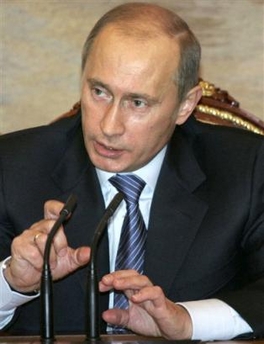|
Little progress in Russia, Iran nuke talks
(AP)
Updated: 2006-02-21 20:41
Officials from Russia and Iran on Tuesday ended two days of talks on a
Russian offer to enrich uranium for Tehran without any signs of progress, though
Russia's foreign minister declined to call the negotiations a failure.

President Vladimir Putin chiars a government
meeting in the Kremlin in Moscow, Monday, Feb. 20, 2006. Russia expressed
limited hope Monday as Russian and Iranian officials started talks in
Moscow on an offer to enrich uranium for Iran, seen as a final opportunity
for the Islamic regime to avoid the threat of international sanctions over
Western concerns it is developing nuclear weapons. [AP]
|
The head of Russia's atomic energy agency, Sergei Kiriyenko, visits Iran on
Thursday for further talks, which are widely seen as Iran's last chance to stave
off international sanctions over suspicions it has a covert nuclear weapons
program.
An initial round of consultations between top national security officials
from both countries on Monday made no visible progress, and on Tuesday experts
from the Russian Foreign Ministry and atomic energy agency held discussions with
the Iranian side.
Russian Foreign Minister Sergey Lavrov underscored that the negotiations were
continuing.
"I would be cautious about using the term 'failure' or 'setback' while the
negotiations continue," he was quoted as saying by the ITAR-Tass news agency.
The Russian offer, which is backed by the United States and the European
Union, is widely seen as the last chance for Iran to address the West's concerns
before a March 6 International Atomic Energy Agency meeting that could start a
process leading to punishment by the U.N Security Council.
Under Moscow's plan, Iran's enrichment activities would take place on Russian
soil to ensure no uranium is diverted for nuclear weapons. Enrichment is a
process that can produce either fuel for a nuclear reactor or material for a
warhead.
Lavrov said after Monday's talks that Iran should resume the moratorium on
uranium enrichment that it broke last month and assuage international concerns
about its nuclear activities to avoid Security Council intervention.
"To achieve that, it's important for Iran to resume a moratorium on uranium
enrichment on its territory and continue contacts between all interested parties
to achieve mutually acceptable agreements," Lavrov said.
He didn't give any details of the negotiations but said there were reasons to
be hopeful that the issue could remain in the hands of the U.N.'s nuclear
watchdog.
The head of the Iranian delegation in Moscow, deputy secretary of the Supreme
National Security Council Ali Hosseinitash, took a tough stance before the
meeting, rejecting any link between the Russian plan and demands for Iran to
restore a freeze on uranium enrichment that it broke last month.
He added that Iran did not intend to renounce its right to produce nuclear
fuel domestically.
IAEA chief Mohammed ElBaradei recently suggested that the international
community might have no choice but to accept small-scale enrichment on Iranian
soil as a condition for Tehran to agree to move its full program abroad, a
diplomat familiar with ElBaradei's thinking said Sunday.
|